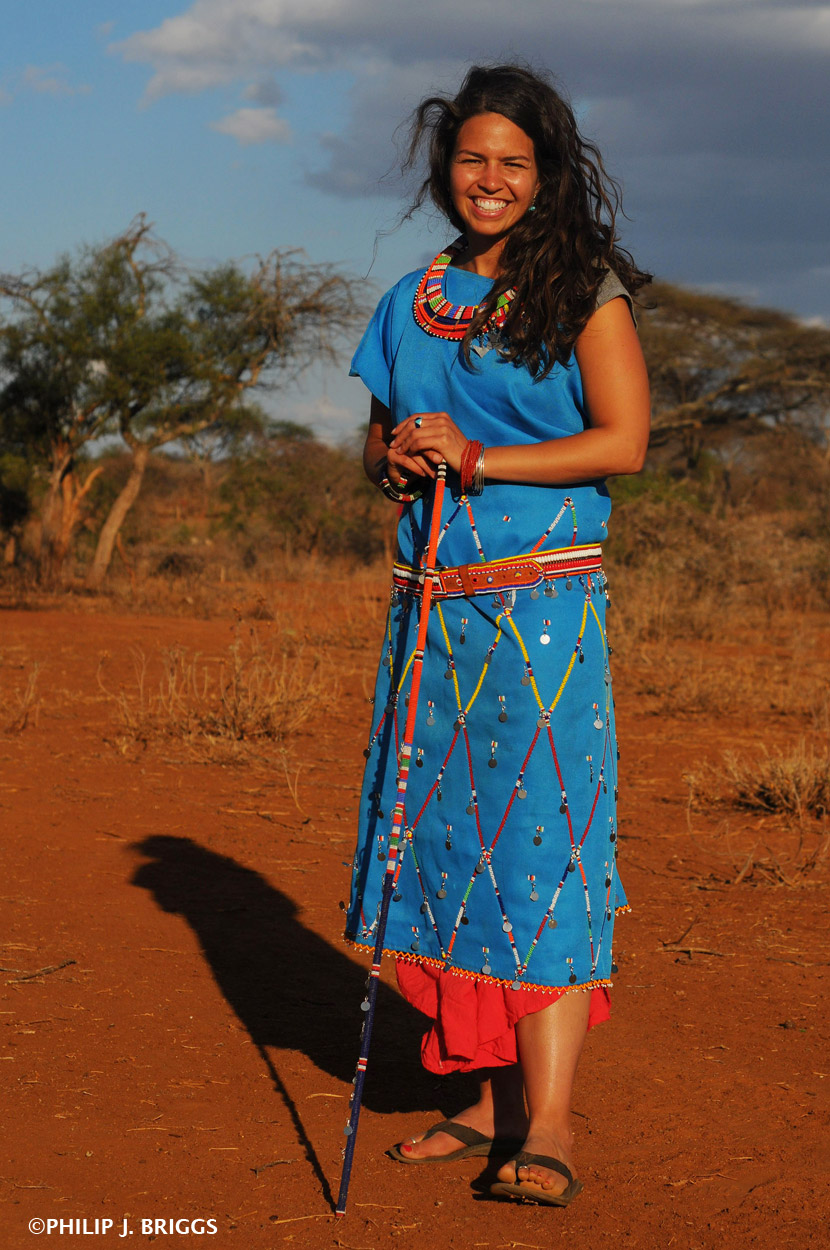In a nutshell, what have you learned about the motivations behind lion killing by Maasai warriors? Do you focus on addressing some motivations more than others?
Leela: I have spent about seven years in school studying this research question. So I am glad you started the question with ‘in a nutshell’ as I could speak forever about this topic.
 Leela Hazzah. Photo courtesy of Philip J. Briggs. Leela Hazzah. Photo courtesy of Philip J. Briggs. |
Briefly Maasai motivation for lion killing is split into two basic categories: social and economic. For example, under social I would include traditional Olamayio hunts where warriors kill lions to gain prestige (and a new lion name) in their communities. Also I would include lion hunts that are motivated by politics (e.g., killing lions to show the government they are unhappy with losing grazing land) in the social motivation category.
Now the economic category would include retaliatory hunts (people lose their livestock/livelihoods, etc. and so they kill the lion in response to their economic loss, but there is obviously an emotional loss as well). In addition, I would include lions being killed for trade in lion parts in the economic category. Though it is important to note that these motivations are at times blurred—as, for example, many retaliatory hunts can also provide a huge amount of social prestige to the warrior who kills the lions first.
Most lion killing that happens is in response to livestock depredation by carnivores so Lion Guardians focus more on the retaliatory motivation more than the others.
How does understanding these motivations and the Maasai’s view of lions influence your interactions with the Lion Guardians/the overall conservation program?
Leela: Understanding the motivations behind lion killing was exceptionally important when designing Lion Guardians because if the underlying reasons for killing is unknown or misunderstood then it will be very difficult to target the intervention appropriately. This is one of the main reasons why conservation/development programs fail. There is a misfit between the problem and the solution.
How do you go about changing the mindset a young man on the verge of becoming a warrior that killing a lion is bad when centuries of tradition hold the practice in high regard - a rite of passage on the path to becoming a respected warrior?
Leela: We don’t try to change the mindset of the warriors to thinking that lion killing is ‘bad’. Instead we are utilizing all of the positive Maasai cultural values toward lions to drive the conservation effort and provide them with an example that living with and protecting lions can provide them similar prestige. For example, today, within Maasailand, employment brings more prestige then does killing a lion. Lion Guardians will say that they ‘love lions like their cows’ and ‘they can now milk lions’—in other words lions provide them the resources to feed their family, but they don’t have to worry about drought, disease, etc. like they would if they were only tending livestock.
|
---------------------------- "[Lion Guardians] have an immense amount of traditional knowledge and, when blended with western-based technologies (like GPS, telemetry) provide a highly qualified group of ‘citizen scientists.’" Leela Hazzah ---------------------------------------------- |
Also, we are utilizing all the traditional skills of a Maasai warrior to both mitigate conflict and to monitor lions. Finding lost livestock, reinforcing livestock kraals, and informing herders of predator presence were all traditional mitigation techniques that Maasai warriors employed. Now Lion Guardians are using these techniques as a proactive way to mitigate conflict in their community, and in turn reduce lion killing.
In addition, warriors have traditionally been recognized by their community as the defense force or army of the community. This job lets them keep this important cultural role.
Because Lion Guardians are young, fit, and experienced in the bush (because of a lifetime of herding and hunting lions) they have all the skills necessary to monitor lions. They have an immense amount of traditional knowledge and, when blended with western-based technologies (like GPS, telemetry), provide a highly qualified group of ‘citizen scientists’. And since 99 percent of all LGs when hired are non-literate, we provide them with literacy training, which also provides the warriors with a great deal of prestige and sense of accomplishment.
| Page: | 1 | | | 2 | | | 3 | | | 4 | | | 5 |